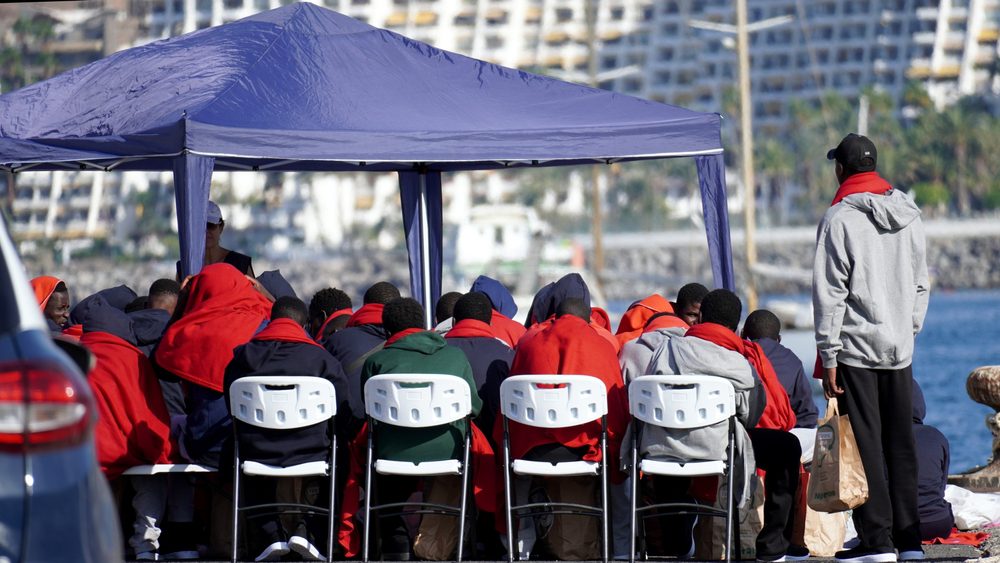
Photo: Canary4stock / Shutterstock.com
The Spanish Canary Islands, which lie off the western coast of Africa, have seen record numbers of illegal migrant arrivals this month, with an average of 550 migrants landing on the islands every day.
So far this month, around 6,200 people have arrived on the islands, often aboard small boats unfit for the dangerous voyage across the Atlantic Ocean. The figure makes up around 30% of the 21,000 migrants who have arrived on the islands throughout 2023, the newspaper El Mundo reports.
Should the rate of landings continue, some of which have seen over 1,000 illegals arrive in a single day, the Canary Island migration route may be set to break its all-time record of 31,678 arrivals, which was set in 2006. The local government has revealed that this month’s numbers are higher than those from October 2006.
Fernando Clavijo, president of the Canary Islands, has claimed that the surge in illegals may be related to ongoing conflicts in West Africa, particularly in Senegal, and claimed that reduced grain shipments due to the ongoing war between Russia and Ukraine may also be a factor.
“All these indicators, together with the fact that at this time of year, the sea is very calm, have caused what we knew was going to happen, especially when the European Union’s controls are being reinforced in the upper part of the Mediterranean,” Clavijo said.
The Canary Islands president has also called on the government to set up a coordinated command to deal with the crisis, noting that as many as six ministries in the government overlapped on migration issues.
He added that the government should request assistance from Frontex, the European Union border agency. In its September migration report, Frontex notes that Senegalese are among the top nationalities seen on the Canary Island migration route so far, echoing Clavijo’s statements on why landings have increased.
The route to the Canary Islands is one of the most dangerous to Europe. People smugglers are often accused of using boats that are not fit for the conditions imposed by the Atlantic. They also often pack boats as full as possible to make as much profit as they can.
In March of last year, the NGO Association for Human Rights of Andalusia claimed that for every hundred migrant men who make the journey, at least five men die. They noted, however, that the number for women is much much higher at around one in ten.
“The reasons for this high number of deaths—404 women, 19% of the total victims—are due to the fact that women, often pregnant or accompanied by minors, are placed on long journeys in the middle of the boats, which in the event of a shipwreck limits their chances of survival, which are further reduced by the responsibility of saving their son or daughter,” the NGO said.
Another Spanish NGO, Caminando Fronteras, claimed in December of last year that since 2018 an average of six migrants have died per day trying to reach Spain, noting that the vast majority of those who died were trying to reach the Canary Islands.
The leftist Spanish government’s handling of the crisis has been slammed by populist-conservative party VOX, particularly a move by Interior Minister Fernando Grande-Marlaska to move 600 migrants from the Canary Islands to Madrid in recent days.
“Marlaska transfers 600 illegal immigrants from Tenerife to Madrid on commercial flights in 48 hours to leave them on the street. While level 5 of terrorist alert is declared in France, the Government is transferring hundreds of African immigrants of military age to our cities who do not know where they are from or what they are. They are putting everyone’s safety at risk,” the party wrote on X, formerly known as Twitter.
Safety concerns amid the illegal migrant surge are not without merit as Spain has previously caught and arrested Islamic terrorists who have come into the country through illegal migration routes.
Some have compared the situation in the Canary Islands to that of the Italian island of Lampedusa, which saw 5,000 illegal arrivals in a single day, nearly doubling the island’s population of around 6,000.
Acting Interior Minister Marlaska has pushed back against the comparison saying the Canary Islands “are not going to become the new Lampedusa,” while speaking at the European Parliament in Brussels earlier this month.
